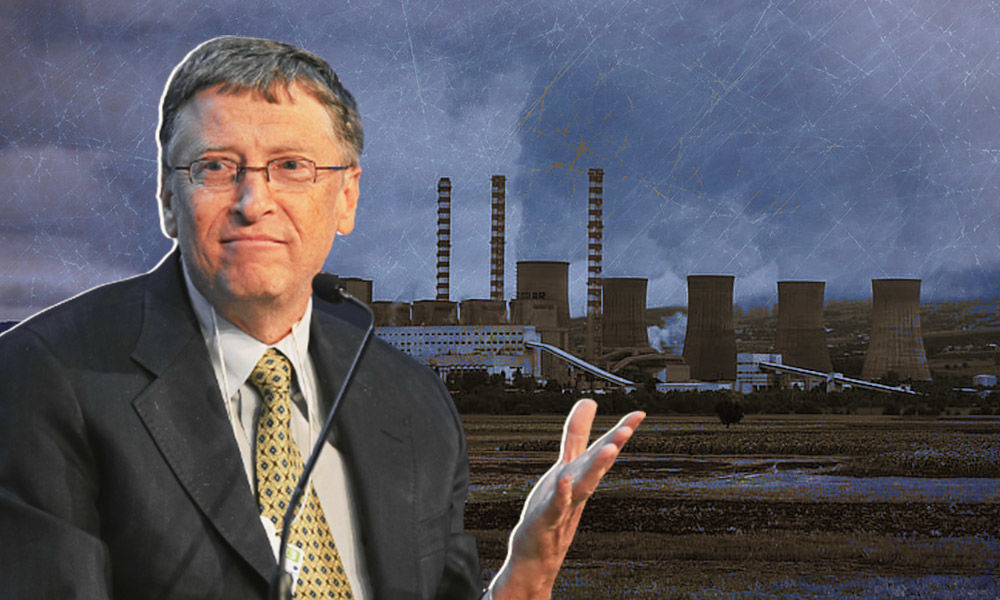Microsoft founder Bill Gates has warned that while COVID-19 is ‘awful,’ the climate change crisis could be ‘worse’.
‘As awful as this pandemic is, climate change could be worse,’ Gates said in a blog published on Tuesday, August 4.
‘When disaster strikes, it is human nature to worry only about meeting our most immediate needs, especially when the disaster is as bad as COVID-19. But the fact that dramatically higher temperatures seem far off in the future does not make them any less of a problem—and the only way to avoid the worst possible climate outcomes is to accelerate our efforts now,’ he said.
The tech mogul and philanthropist said that in order to avoid a climate disaster, we have to act now by building and deploying innovations that will help to eliminate the greenhouse gas emissions.
‘Analysts disagree about how much emissions will go down this year, but the International Energy Agency puts the reduction around 8 percent. In real terms, that means we will release the equivalent of around 47 billion tons of carbon, instead of 51 billion,’ he said.
Talking about the reduction in emissions as economic activity has slowed down amid the pandemic, Gates said, ‘Consider what it’s taking to achieve this 8 percent reduction. More than 600,000 people have died, and tens of millions are out of work. This April, car traffic was half what it was in April 2019. For months, air traffic virtually came to a halt.’
‘To put it mildly, this is not a situation that anyone would want to continue. And yet we are still on track to emit 92 percent as much carbon as we did last year. What’s remarkable is not how much emissions will go down because of the pandemic, but how little,’ he added.
To stress on the potentially devastating climate emergency, Gates said, ‘If you want to understand the kind of damage that climate change will inflict, look at COVID-19 and spread the pain out over a much longer period of time. The loss of life and economic misery caused by this pandemic are on par with what will happen regularly if we do not eliminate the world’s carbon emissions.’
He then compared the mortality rate of coronavirus, which is approximately 14 deaths per 100,000, to the expected increase in mortality rate due to rising global temperatures.
‘Within the next 40 years, increases in global temperatures are projected to raise global mortality rates by the same amount—14 deaths per 100,000. By the end of the century, if emissions growth stays high, climate change could be responsible for 73 extra deaths per 100,000 people. In a lower emissions scenario, the death rate drops to 10 per 100,000,’ he said.
Gates added that, in either projection, the mortality rate is either similar to current coronavirus death rates, or far higher.
‘By 2060, climate change could be just as deadly as COVID-19, and by 2100 it could be five times as deadly,’ he said.
Gates added that the economic damage from climate change would be the equivalent of having a COVID-19 pandemic every decade. ‘And by the end of the century, it will be much worse if the world remains on its current emissions path,’ he said.
If we learn the lessons of COVID-19, we can approach climate change more informed about the consequences of inaction, and more prepared to save lives and prevent the worst possible outcome. https://t.co/a1Ltv44UBY
— Bill Gates (@BillGates) August 4, 2020
‘The key point is not that climate change will be disastrous. The key point is that, if we learn the lessons of COVID-19, we can approach climate change more informed about the consequences of inaction, and more prepared to save lives and prevent the worst possible outcome. The current global crisis can inform our response to the next one,’ Gates added.
Calling for drastic change, Gates noted that flying or driving less wasn’t going to help us achieve zero emissions.
‘Just as we need new tests, treatments, and vaccines for the novel coronavirus, we need new tools for fighting climate change: zero-carbon ways to produce electricity, make things, grow food, keep our buildings cool and warm, and move people and goods around the world,’ Gates, who has been advocating for pandemic preparedness for years, said.
‘And we need new seeds and other innovations to help the world’s poorest people—many of whom are smallholder farmers—adapt to a less predictable climate,’ he added.
Meanwhile, Gates also stressed that the solutions should be such that it will work for poor countries as well, stating that climate change will worst-hit the poorest people in the world.
‘We don’t yet know exactly what impact COVID-19 will have on the world’s poorest people, but I am concerned that by the time this is over, they will have had the worst of it. The same goes for climate change. It will hurt the poorest people in the world the most,’ he said.
Referring to a study by Climate Impact Lab, Gates said that while climate change will increase the global death rate globally, ‘the overall average will obscure an enormous disparity between rich and poor…












